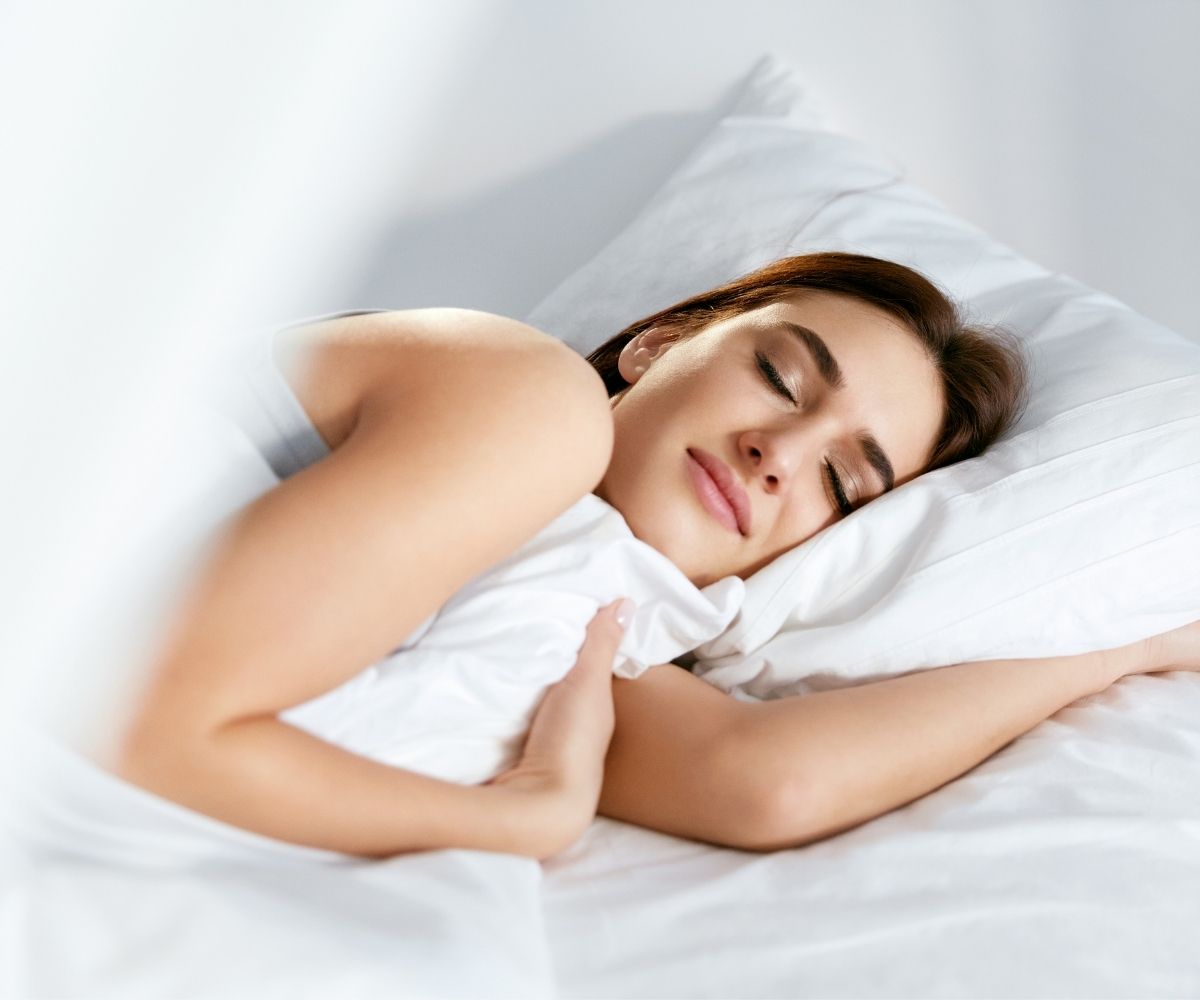Every woman dreams of having perfect skin and a radiant appearance that turns heads.
But, what if I told you that not only can your dreams of beautiful skin come true, but the best way to achieve it is while you dream? This article explores sleep’s ability to affect your skin quality and how you can leverage this effortless task to enhance how you look and feel.
It might sound overly simplistic, but solutions are often less complicated than we make them out to be. After all, we call it beauty sleep for a good reason.
Have more downtime to power up
If you have ever missed a good night’s sleep, you will remember how groggy you felt the next day. You will likely have noticed the ’bags’ under your eyes, characterised by dark circles that could easily have you pass for a panda and your irritable state of mind.
We all know that a good night’s sleep is essential for feeling refreshed and energised. But beyond just combating daytime drowsiness, sleep plays a vital role in our overall health and well-being. It impacts everything from our mood and cognitive function to our immune system and metabolism.
Yet, one area where sleep’s influence is often underestimated is its profound impact on our skin. While we diligently apply serums and creams, we sometimes forget that true skin rejuvenation happens from the inside out, and sleep is a key player in that process.
This article aims to change how you think about sleep and skin care, so you can get the most out of your beauty treatments, rather than try to correct problems caused by poor lifestyle habits.
The science of sleep’s magical effect on skin quality
Sleep is a marvel. It is probably the most important thing you do for yourself. Its importance is highly underestimated. You could go longer without food than you could without sleep. Our body goes through several rejuvenating processes while we sleep to ensure we are restored physically and mentally, and our skin is no exception to that. Yet, we take this wonderful gift for granted.
Below are some ways sleep helps rejuvenate your skin. It is like having a free makeover every night.
Skin Cell Regeneration
During sleep, your skin undergoes a significant repair and renewal process known as cellular turnover. Skin cells are constantly regenerating, shedding old cells and replacing them with new ones. But during sleep cell turnover and repair occur at an accelerated rate, resulting in healthier and more radiant skin. This regenerative process is crucial for maintaining a youthful appearance and combating signs of ageing.
Cellular turnover is miraculous and it goes hand-in-hand with Opulent Aesthetic’s microneedling and chemical peel treatments, which trigger the body’s natural healing process to improve skin quality. It is essential to get a good night’s sleep after these beauty treatments.
Collagen Production
Collagen is the protein responsible for skin’s firmness and elasticity. Sleep promotes collagen production, helping to smooth fine lines and wrinkles. By ensuring adequate rest, you support your skin’s structure and its ability to maintain a plump, youthful appearance.
Opulent Aesthetics advises its clients to get adequate rest and sleep after wrinkle treatments to ensure that beauty treatments are as effective as they can be and last as long as possible.
Hormone Regulation
Sleep plays a critical role in regulating hormones like cortisol and growth hormone.
Elevated cortisol levels, often due to lack of sleep, can lead to increased stress, which negatively affects skin health. Growth hormone, on the other hand, aids in tissue growth and repair, essential for beautiful skin.
Growth hormone is like having a natural skin booster and compliments the hyaluronic acid treatments that we provide.
Blood Flow
Proper circulation during sleep delivers oxygen and nutrients to your skin, promoting repair and rejuvenation. This improved blood flow contributes to a radiant complexion and enhances your skin’s natural glow.
Hydration
A lack of sleep is linked with poor hydration in the dermis (skin), which leaves the skin dry and flaky. The mechanism isn’t entirely understood, but studies have shown that even one night of sleep deprivation can adversely affect the skin’s hydration levels, leading to wrinkles and puffiness making you look older than you should.
The visible consequences of poor sleep
If you have a bad night’s sleep or worse, have a repeated pattern of poor-quality sleep, it will become very apparent from the quality of your skin, particularly your face. Here are some examples of the visible impacts.
Dark Circles and Puffiness
Lack of sleep causes fluid to build up under the eyes, leading to dark circles and puffiness. These are tell-tale signs of sleep deprivation and can be exacerbated by elevated cortisol levels.
Skin boosters and wrinkle treatments are great ways to combat this, but Opulent Aesthetics always encourages clients to supplement this with good sleep patterns, rather than substitute it.
Dull Complexion
Poor sleep reduces blood flow to the skin, resulting in a lacklustre appearance. More than this studies show that a lack of sleep causes disturbances in blood pressure, which not only increases health risks but manifests itself through poor-quality skin. Without the rejuvenating effects of sleep, your complexion may appear dull and tired.
Your body, including your skin, requires nutrition and oxygen. This is delivered through your blood flow, so poor-quality sleep produces a domino effect on your skin health.
Skin booster treatments help improve your skin quality, but they work best when your sleep routine is in order.
Wrinkles and Fine Lines
Sleep deprivation accelerates collagen breakdown, leading to premature ageing and the formation of wrinkles. Ensuring adequate rest is crucial for maintaining skin elasticity and reducing the appearance of fine lines.
Our wrinkle treatments can help you fight the signs of ageing, but their effectiveness is enhanced by good quality sleep.
Acne and Inflammation
Insufficient sleep can increase inflammation and stress hormones, worsening acne and other skin conditions. Managing sleep quality is essential for maintaining clear and healthy skin.
Dryness and Dehydration
Sleep deprivation affects your skin’s hydration levels, leading to dryness and flakiness. Without proper moisture balance, your skin may lose its suppleness and smoothness.
Our skin booster treatments provide hyaluronic acid that increases hydration levels in the skin, however, their impact is best observed after a good night’s sleep.
How to get the most out of sleep
Sleep, like most things you frequently do in life, is a ritual, or at least it should be. Treating sleep like a ritual that leads to winding down at a certain time and readying for bed will greatly enhance the quality of your sleep and its rejuvenating effect.
Here are tips on how to promote better sleep.
Sleep Hygiene
Sleep hygiene refers to the practices you take that promote good sleep and often involves eliminating things that may undermine it.
It’s important to take control over your sleeping habit and go into it with a certain amount of intention, rather than waiting until you feel tired or exhausted before going to bed.
Consistent Sleep Schedule
Going to bed and waking up at the same time every day, even on weekends, is a great way to regulate your body’s internal clock. Scientists call this clock the ‘circadian rhythm’.
Having breakfast as soon as you get up and making sure that you get lots of sunshine as early as possible (at least 20 minutes) has a notable effect on your circadian rhythm. It helps keep your waking and sleep cycles in a consistent and predictable order.
Relaxing Bedtime Routine
Create a calming pre-sleep routine, such as taking a warm bath (not hot), reading, or listening to soothing music, and dimming the lights support a good night’s sleep. Candle lights are great because our brain is not stimulated by it in the same way as artificial lights. It is likely because our evolution likely involved sleeping around the campfire.
Switching to candle lights two hours before bedtime will likely have you ready for a perfect night’s sleep.
Sleep-Conducive Environment
Ensure your bedroom is dark, quiet, and cool to promote restful sleep. These sound like simple tips, but making slight adjustments can prove the world of difference. Consider how much light is coming through your window, be it street lights at night or the sun in the morning. By having good quality blacked-out curtains, you will find yourself falling asleep easier and staying asleep for longer, all of which will contribute to deeper and more restorative sleep.
Your room temperature should be cool, not hot. Your body actually dips in temperature just before sleep and likes to stay cool. Even a slightly elevated body or room temperature can disturb your sleep. It’s ok to keep your socks on though.
If possible, turn off any light producing devices, even the standby light can disturb your sleep. Needless to say, your room should be totally silent. If there are sounds that disturb you, consider getting good quality earplugs.
Screen Time
Limit exposure to screens before bed, as blue light can interfere with your ability to fall asleep. This is because your body releases melatonin, a hormone that promotes sleep, as the sun goes down – darkness is its cue to do so. For obvious reasons we evolved this way, so it is best to avoid looking at your phone or any screen for at least an hour before bed and avoid looking at a screen for the first hour after waking.
You can buy glasses with blue-light filters that minimise the amount of blue light produced by modern devices, which will help you maintain good sleep hygiene practices.
Stress Management
We have all been there when our mind is overactive and it prevents us from sleeping. Adopting mindful practices will help ease your mind into sleep mode.
Relaxation Techniques
Incorporate stress-reduction techniques like meditation, yoga, or deep breathing exercises to relax your mind and body. You can do this just 10 minutes before bedtime, but for best results try 20-40 minutes.
Diet and Exercise
Your physical activity and consumption habits will directly affect your sleep quality and the restoration you get from it, so it’s better to plan ahead.
Balanced Diet
Maintain a healthy diet to support sleep quality and overall skin health. Kiwi’s have been scientifically proven to improve gut health and promote sleep. Eating two kiwi’s two hours before bedtime will release tryptophan, a neurotransmitter that aids sleep.
Avoid eating heavy meals too close to bedtime because this will likely interfere with your body’s ability to switch off. Avoid caffeine after 3 pm, and if possible, limit caffeine consumption to the early morning. Alcohol should also be avoided too close to bedtime as it too will disrupt your sleep.
Regular Exercise
Engage in regular physical activity to improve sleep, but avoid exercising too close to bedtime. Increasing your metabolic rate will likely keep you up. Allow at least 2-4 hours before sleeping.
Final thoughts
If we presented all of the benefits of sleep and said it was available in one handy pill, people would queue up to buy it and the company selling it would be worth billions overnight (valid pun).
Yet, the benefits of sleep are available for free and people forego it daily. Sleep will enhance your youthful appearance more than anything else you could ever do and its restorative benefits compliment the beauty treatments Opulent Aesthetics has to offer.
Ensuring high-quality sleep is just one of the ways you can maintain or enhance your youthful appearance. If you are looking for beauty treatments to give you that extra edge, Opulent Aesthetics in Caterham and Purley has a range of anti-ageing treatments, including wrinkle treatment, skin boosters, dermal fillers, microneedling and chemical peels.
Looking and feeling young and beautiful has never been so easy. To find out more, speak with our lead clinician, Sadie, who will guide you through your options.
Beauty is in you, now, always and forever.

